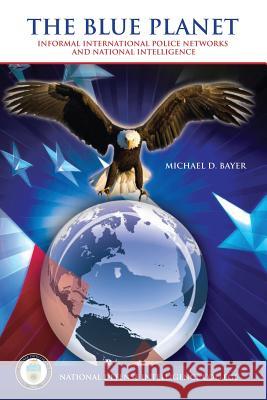The Blue Planet: Informal International Police Networks and National Intelligence » książka
The Blue Planet: Informal International Police Networks and National Intelligence
ISBN-13: 9781523692781 / Angielski / Miękka / 2016 / 204 str.
The Blue Planet: Informal International Police Networks and National Intelligence
ISBN-13: 9781523692781 / Angielski / Miękka / 2016 / 204 str.
(netto: 50,36 VAT: 5%)
Najniższa cena z 30 dni: 50,34
ok. 16-18 dni roboczych.
Darmowa dostawa!
"The Blue Planet: Informal International Police Networks and National Intelligence," makes a powerful argument for why the United States needs to make better use of its federal law enforcement agencies abroad as an integral part of our national counterterrorism strategy. Bayer's book criticizes the primacy of the military/intelligence model in our foreign counterintelligence strategy, arguing that the counterterrorism role reserved for the FBI makes insufficient use of the global networking capabilities of our many other American law enforcement agencies abroad. Bayer's book makes an important contribution to the literature on international governmental networks describing the unique ability that informal networks of cooperating law enforcement agencies have to collect information about local conditions and local communities that may prove crucial in identifying terrorist threats and preventing terrorist attacks. Bayer argues that such networks have proven immensely successful in investigating organized crime, but that these capabilities have been underused against international terrorist networks. By virtue of their omnipresence around the globe, police are "natural anticipatory collectors" of vast amounts of information. They are for that reason well-placed to detect suspicious activities-particularly given the overlap between terrorist cells and criminal networks. Law enforcement personnel have a unique ability to draw on trust and a common culture with their counterparts in other countries, resulting in a regular informal interchange of useful information. Bayer recognizes the particular advantage that the police enjoy by virtue of their professional autonomy and relative independence from the centers of political decision-making. The same forces that insulate them politically facilitate close, albeit informal, cooperation between law enforcement agencies from such vastly different legal systems as those of the United States, Cuba, China, and Indonesia. Informal police cooperation thrives because it benefits not only powerful countries like the United States, which depend on information flows from a large variety of cooperating countries, but also relatively weak police entities seeking to increase their professionalism and autonomy from their own political centers. Given their special access to sources of intelligence not easily exploitable by the intelligence establishment, law enforcement agencies could play a much more important role than they currently do as full partners in a comprehensive American counterterrorism strategy.
Zawartość książki może nie spełniać oczekiwań – reklamacje nie obejmują treści, która mogła nie być redakcyjnie ani merytorycznie opracowana.











